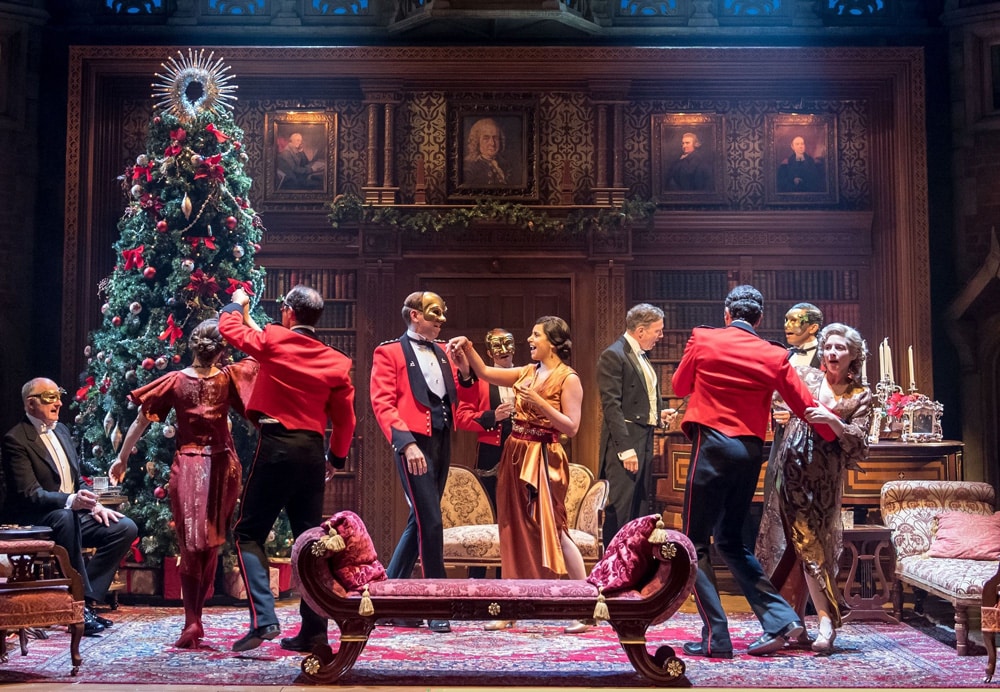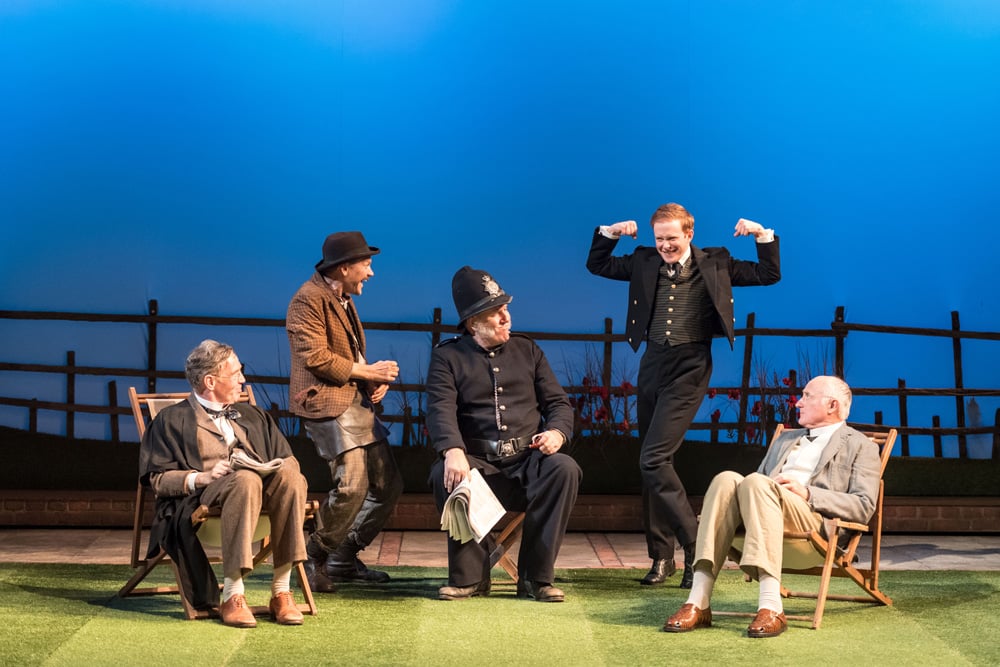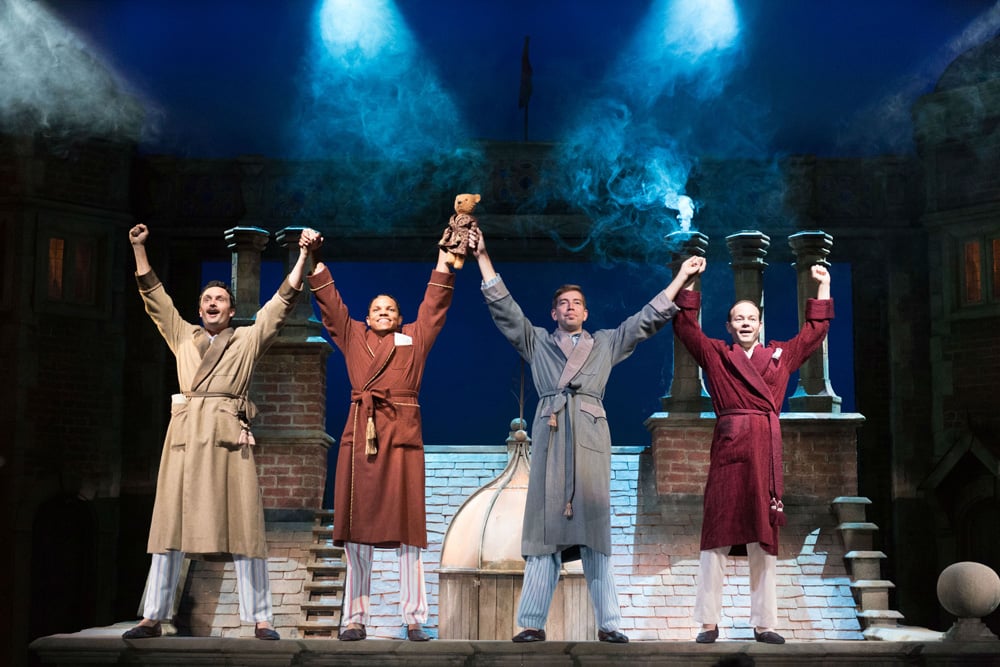
Love’s Labour’s Lost and Much Ado About Nothing
Theatre Royal Haymarket
Five stars (for both shows)
15 December 2016
Book Tickets For Much Ado About Nothing
Book Tickets For Love’s Labour’s Lost
Writers have long speculated over the mystery of Shakespeare’s “missing” play, Love’s Labour’s Won, mentioned in passing in a few documents of the time. Scholars generally suspect that it was, in fact, an alternative name for his dark comedy, Much Ado About Nothing, given the alternative title because of the popularity of the earlier Love’s Labour’s Lost. The Royal Shakespeare Company has run with this idea to create a perfect pairing of the two plays that share a mix of broad comedy with darker elements, albeit to different degrees.
The plays’ settings of Navarre in northern Spain and Messina in Sicily have been re-imagined in an English country house, based on Charlecote Park near Stratford-upon-Avon, with accomplished sets designed by Simon Higlett. The double bill is also given extra resonance by the costumes, sets and music placing them around World War One, with Love’s Labour’s Lost in summer 1914 and Much Ado About Nothing taking place at Christmas 1918. This fits in perfectly with the sombre ending of Love’s Labour’s Lost and the characters’ return from war in Much Ado About Nothing.

Despite its bittersweet ending, Love’s Labour’s Lost is a joyful production. The flirtatious banter between the four courting couples is a delight as the bachelors, having pledged to avoid women for three years of study, skirt round their oaths to win over the French princess and her three ladies. Highlights include the men disguising themselves as dancing Russians in a hilarious, wildly choreographed routine. The bachelors are an amusing quartet led by the excellent Sam Alexander as the King of Navarre with Edward Bennett as Berowne, William Belchambers as Longaville and Tunji Kasim as Dumainel. They are matched by the women, played by Leah Whitaker as the princess, Rebecca Collingwood as Katharine, Paige Carter as Maria and Lisa Dillon as Rosaline whose sparring with Berowne foreshadows their pairing in Much Ado About Nothing.
Even broader comedy comes from John Hodgkinson as the Spanish traveller, Don Armado, who provides classic humour with his overblown mannerisms and artful mispronunciations, referring to “arse tits” instead of artists and “men of piss” instead of peace. Spouting ostentatious Latin phrases, Stevlen Pacey is particularly good as the pedantic schoolmaster Holofernes, with further strong performances by Chris McCalphy as PC Dull and Peter McGovern as the servant, Moth. They all come together to perform the hilariously chaotic entertainment, “The Seven Worthies”, adapted into the style of an operetta by composer Nigel Hess whose music beautifully enhances the comedy and drama throughout both shows.
With the men off to war at the end, Love’s Labour’s Lost switches to a mournful tone for which the only antidote is Love’s Labour’s Won. Although the characters are different, the cast and setting for Much Ado About Nothing are the same, but with a more carefree post-war mood heralding the approach of the Roaring Twenties and the jazz age.

Edward Bennett and Lisa Dillon raise plenty of laughter in the quarrelsome courtship between Benedick and Beatrice. In one particularly inventive scene, Bennett’s physical comedy while eavesdropping behind the arras evokes the spirit of Eric Morecambe. Tunji Kasim and Rebecca Collingwood are a solid Claudio and Hero but Steven Pacey stands out as Hero’s father, Leonato, who is heart-breaking when faced with accusations about his daughter’s virginity. Leading the villagers, the classic comic role of inept constable Dogberry becomes more of a fully rounded individual in the hands of Nick Haverson in a way that, in a first for me, it balances the broad comedy with touches of pathos. His examination of the two prisoners in his cramped and crowded home descends into surreal buffoonery that recalls the Marx Brothers but, by the end, you feel his frustration at being unable to cope with the situation, not least because of a shuddering medical condition.
The music of Nigel Hess again enhances the drama, most notably with his song using the lyrics of Christopher Marlowe’s “Come Live With Me and Be My Love”, performed by Harry Waller as Balthasar on the piano in the style of an Ivor Novello ballad and then echoed to great effect as a recurrent theme in the play’s atmospheric incidental music.
Both productions, originally staged in Stratford-upon-Avon in 2014, come to London via Manchester Opera House and Chichester Festival Theatre in fine form, inventively and expertly directed by Christopher Luscombe. Despite the downbeat ending to Love’s Labour’s Lost and the troubles over Claudio and Hero’s wedding in Much Ado About Nothing, the two plays are very funny and thoroughly entertaining, whether enjoyed singly or, ideally, seen together.
Running to March 18
